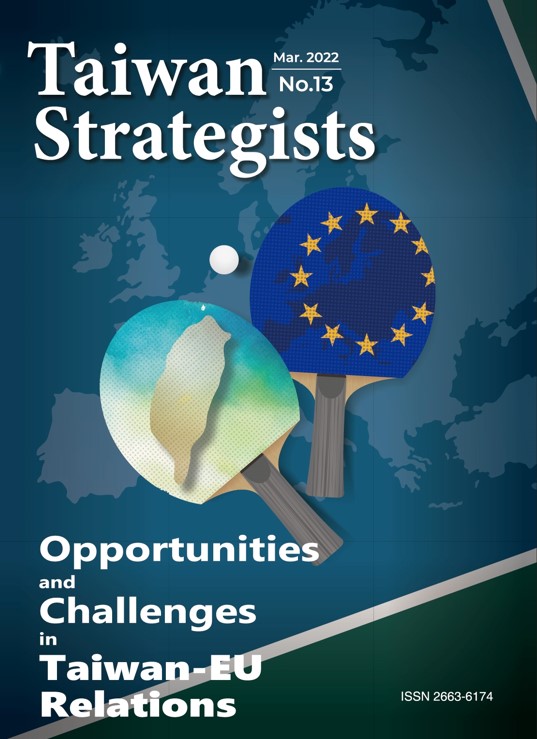Taiwan Strategists No. 13
- PDF1. Lithuania’s Values-Based Foreign Policy Toward a Rebalance in EU-China Relations
- PDF2. Recent Developments in Relations Between Visegrád Group Countries and Taiwan Explained (2018-2022)
- PDF3. Will the Recent Strengthening of Relations between Taiwan and Europe Lead to a Comprehensive EU Taiwan-Friendly Policy
Lithuania’s Values-Based Foreign Policy Toward a Rebalance in EU-China Relations?
Zsuzsa Anna Ferenczy
Adjunct Assistant Professor, Department of Public Administration, National Dong Hwa University;
Head of Associate Network, 9DASHLINE
In the midst of growing geopolitical tensions, a new reality has been unfolding in EU-China relations. While the two sides agreed to pursue a strategic partnership for mutual benefit, their cooperation is burdened by a normative divergence and lack of economic reciprocity that have been detrimental to European interests. Skeptical of China, the EU sees Taiwan as a key partner in the face of an authoritarian advance. Yet, developing a joint European response has been difficult. This paper argues that Lithuania’s turn toward democratic Taiwan and Beijing’s retaliation have accelerated the convergence in member states’ perceptions of China as a risk to Europe’s moral and economic integrity. Lithuania’s pursuit of a values-based foreign policy is pushing member states to address their vulnerabilities and move toward a rebalance in their ties with China. Increasing the EU’s overall resilience is indispensable to better leverage its global weight and pursue a values-based economic diplomacy.
Keywords: EU, China, Taiwan, Lithuania, Economic Coercion
Recent Developments in Relations Between Visegrád Group Countries and Taiwan Explained (2018-2022)
Anna Rudakowska
Associate Professor, Department of Global Politics and Economics, Tamkang University;
Senior Associate Researcher, Department of Political Science, Vrije Universiteit Brussel
The Taiwanese media and public have recently paid growing attention to the countries in Central and Eastern Europe (CEE). Taipei’s efforts to develop ties with Lithuania and the Czech Republic, as well as Poland and Slovakia, have become a hot topic. Headlines in the press lauded each related event: “Lithuania Shows Blueprint to Oppose China,” “Taiwan and Poland Tied by Love of Democracy,” “The New Czech Foreign Minister Calls Taiwan Important Economic Partner ‘Taiwan is Several Times More Important than China.’”1 Despite some titles showing more restraint, in general, expectations regarding Taiwan – CEE cooperation seem to be high.
This article attempts to explain the most recent developments in relations between selected Central and Eastern European countries (CEEC) towards Taiwan. It looks at the Czech Republic, Hungary, Poland and Slovakia — the four members of the Visegrád Group (Visegrád Four, later V4) — an alliance formed in 1991 by the countries of the Central Europe to advance cooperation on issues of common interest. It traces their foreign policy choices concerning relations with China and Taiwan since the end of Cold War, inquiries into the decisive factors behind them, and examines the static and changing elements in their relations with both Asian partners. Finally, it provides policy recommendations.
Will the Recent Strengthening of Relations between Taiwan and Europe Lead to a Comprehensive EU Taiwan-Friendly Policy?
Yun-chen Lai
Associate Professor, Department of Public Administration;
Executive Director, EU Research Center,
National Dong Hwa University
Europe-Taiwan relations have warmed substantially recently, leading to speculation that the EU could shift to a more Taiwan-friendly policy. However, this new amity comes from certain CEEC and specific EU institutions, chief among them Lithuania and the European Parliament. As the European Union is an aggregate of 27 member states and various institutions, EU-Taiwan relations rely not only on specific member states, but also on the union as whole. Furthermore, the positions and interests of the EU member states toward Taiwan and China are varied, making it difficult for the EU to find a united stance in dealing with Taiwan and China. In other words, support from a limited number of member states and institutions is not enough for the Union to change its policy dramatically. Due to the differences between EU actors and European states, even though there has been increasing engagement of Europe with Taiwan, it is unlikely that there will be a major shift within the EU such as the adoption of a EU-wide approach to Taiwan in the near future.
Keywords: EU-Taiwan Relations, Taiwan-Lithuanian Relations, Taiwan-CEEC Relations, 17+1 Forum, European Parliament




